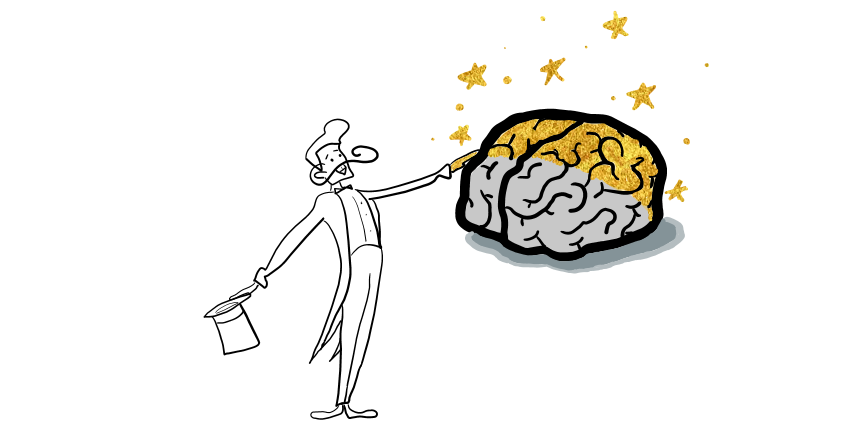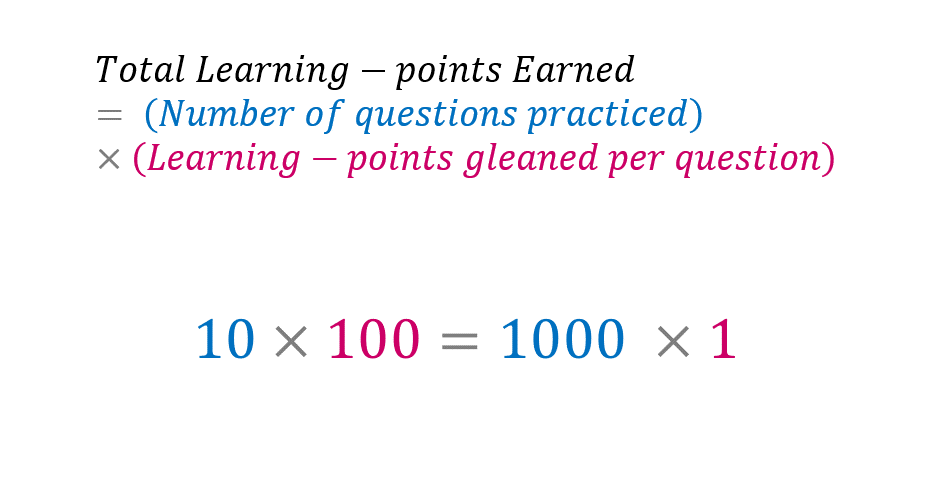Many GRE students seem to believe, no doubt without consciously realizing it, that their prep resource of choice has golden touch like King Midas: the course or the book has to touch them just once and immediately, magically, their leaden ignorance would be transmuted into golden understanding. And if one round through the course or book does not improve their score, they conclude that this course or book does not have the Midas touch, and so, they start searching for the course or book that does (seem to) have this magical ability.
And so, one keeps running from one prep resource to the next in his desperate search for the magical one that will transform his score.

(Drawing by Japinder Kaur)
I talked to one such student a few days back.
He was a working professional who had taken the GRE FOUR times but had failed to improve his Verbal score much – it had been 144, 142, 145 and 146. He was now thinking about a final try at the GRE to see if he could get a V153 (a score that is at the 60th percentile and, hence, is “above-average”) and wanted to know if and how he could reach there.
He said that his main problem in Verbal was that his accuracy dropped under timed conditions; it was fine when he solved questions without a time limit.
He had taken the first and second attempts without much preparation. For his third and fourth attempts, he had prepared Verbal with Greg Mat’s videos, and by now, he had gone through all the Verbal videos on Greg’s website. While he thought the videos were good, they had failed to improve his score. Being on a tight budget, he could not afford to buy any new courses and books or to work with a coach (such as myself) before the next attempt, and he worried if this meant that he would not be able to improve in Verbal.
For Attempt #5, the prep plan that he had devised was to chuck all the resources he had used till now and pick up the Big Book (because he had read many success stories online where people had practiced with this book and improved their Verbal score by a lot). He wanted to know if this would be a good idea.
To answer his question, I needed to understand how he had studied with Greg Mat’s videos. “Let’s take an RC Technique video. Tell me what you did with it.”
“Well, I watched it.”
“Did you have a pen and paper in hand?”
“No, I usually watched the videos while eating my lunch or dinner or sometimes, when taking a walk.”
“Did you not have dedicated study hours?”
“I did. I’d downloaded many GRE prep books from the internet. Each night, during my study hours, I would solve questions from one or another of these books. Or I would do questions from the GRE Prep Club.”
“When a Greg Mat video came to a question, did you pause it to solve the question yourself first?”
“Mostly, yes. I would pause, think what the answer should be and then resume viewing.”
“Do you have any record of these attempts or were they all done mentally?”
“I did them mentally.”
“How often did you revise a technique video that you had already watched or the questions that you had found to be tough in a video?”
“Sometimes. Not often.”
This student had a touching faith in the Midas Touch Fallacy!
Any prep resource only gives you information units. The transmutation of ‘information’ into ‘knowledge’ is to be done by YOU. You work the magic. And this magic takes time. A single pass through a video or a book chapter is NOT enough to make the lessons a part of your intuition.
This student buckled under time pressure because he had not learned the accuracy-improving Verbal techniques as well as he imagined; those techniques had not yet become a part of his intuition. He may now know perfunctory details about these techniques – their names and definitions – but they were yet to take root in his mind. Under stress or time-pressure, he forgot all about this superficial layer of learning, resorted to his default answering process and performed poorly.
In contrast, would he have made a mistake in adding 4 and 6, no matter how stressed or time-pressed he was? Unlikely. This basic addition process would probably have sunk so deep in his mind that he would “automatically”, “in a blink” “just know” the answer. THIS would be a lesson that he had internalized.
You can claim to have internalized a Verbal technique when you “just apply” it, “automatically”, as your “default approach”, without really having to think about it.
If you solve a Verbal question right now in one way and your prep resource shows you another, quite different way, then to internalize that strategy would essentially mean replacing your default thought process for such questions with another thought process that feels foreign to you at present. Your task is essentially two-fold: to get over a bad thinking-habit and to form a good thinking-habit. How much practice do you think it will take? How much practice does habit change require? Is watching a technique video once likely to be enough?
Going through any prep resource passively does not equal studying. It feels virtuous to spend an hour watching a GRE course video instead of your favorite series on Netflix, but that hour does not actually count as “study time” if you don’t actively engage with the material.
Here is my response to this student:
I first reassured him that he could indeed improve his score without shelling out any more money on prep resources. I also agreed with his self-assessment that he needed more practice but not of the type he had imagined – I did not think that merely doing questions from the Big Book would be the best use of his time.
What he needed to focus on was the SE/TC and RC techniques that he knew superficially at present. He needed to practice them till he could apply them unconsciously to every question.
What would such practice look like?
I suggested that he redo the Greg Mat videos from which he had learnt those techniques.
I also emphasized that by redoing, I did not mean just watching the videos one more time; rather, I wanted him to create deep practice exercises using these videos and showed him a way to do so with one Greg Mat video: GRE Reading Passage Strategy – Technique 1: Simplify the Sentences – YouTube:
- With your notebook open and a pen in your hand, play the video.
- Pause when Greg starts explaining the first sentence.
- Anticipate what he will say, simplify the sentence yourself, and write down your simplification in your notebook.
- Now play the video to compare your attempt with Greg’s.
- See how you fared. Did you fail to simplify as well as him? Did you not understand a sentence clearly because you were reading too many chunks together, whereas Greg digested one part of the complex sentence first and only then moved to the next part?
- Most important – Make note of such misses and your takeaways.
Go through the same process for the entire video, working sentence-by-sentence with the teacher.
Start the next study session by revising your notes from the first one. Create – and follow – a spaced repetition plan for your notes. Do all the practice exercises suggested for the first lesson before moving on to lesson #2.
The same idea can be applied to do deep, deliberate practice with any video course or textbook.
(I should clarify that I suggested the Greg Mat course to this student only because he had already done it once; he was familiar with the lay of the land there, and it would be easier for him to study again with the same course than to enter the foreign territory of a new course. If he had studied before with course or book X, then redoing X is what I would have suggested to him, unless of course I thought X to be unhelpful.)
Going in this way through a course or book would be slower. I know that you could have run over many more questions in the time I am making you spend on a single lesson. But realize that not running does not mean standing still. Rather, you are now diving deeper into the lesson, and depth brings confidence and mastery. If you extract 100 learning-points each from 10 questions, then you earn 1000 learning-points overall. In contrast, a runner – someone who is always running, always doing more questions, never returning to the same lesson or question again – because he is always in such a hurry to cover more material and so never consolidates his learning and never observes the patterns in his lessons and in his mistakes, may only extract 1 learning-point per question. So, he would have to do 1000 questions to learn as much as a diver could learn with just 10 questions!

When seen this way, through the lens of learning outcomes, whose learning process looks slower – the runner’s or the diver’s?
No prep resource has the Midas Touch. Your scores are a lagging measure of your learning processes. If you care about the former, focus on the latter. To make your score golden, improve the way you learn.
Written by Japinder Kaur; also published on LinkedIn.